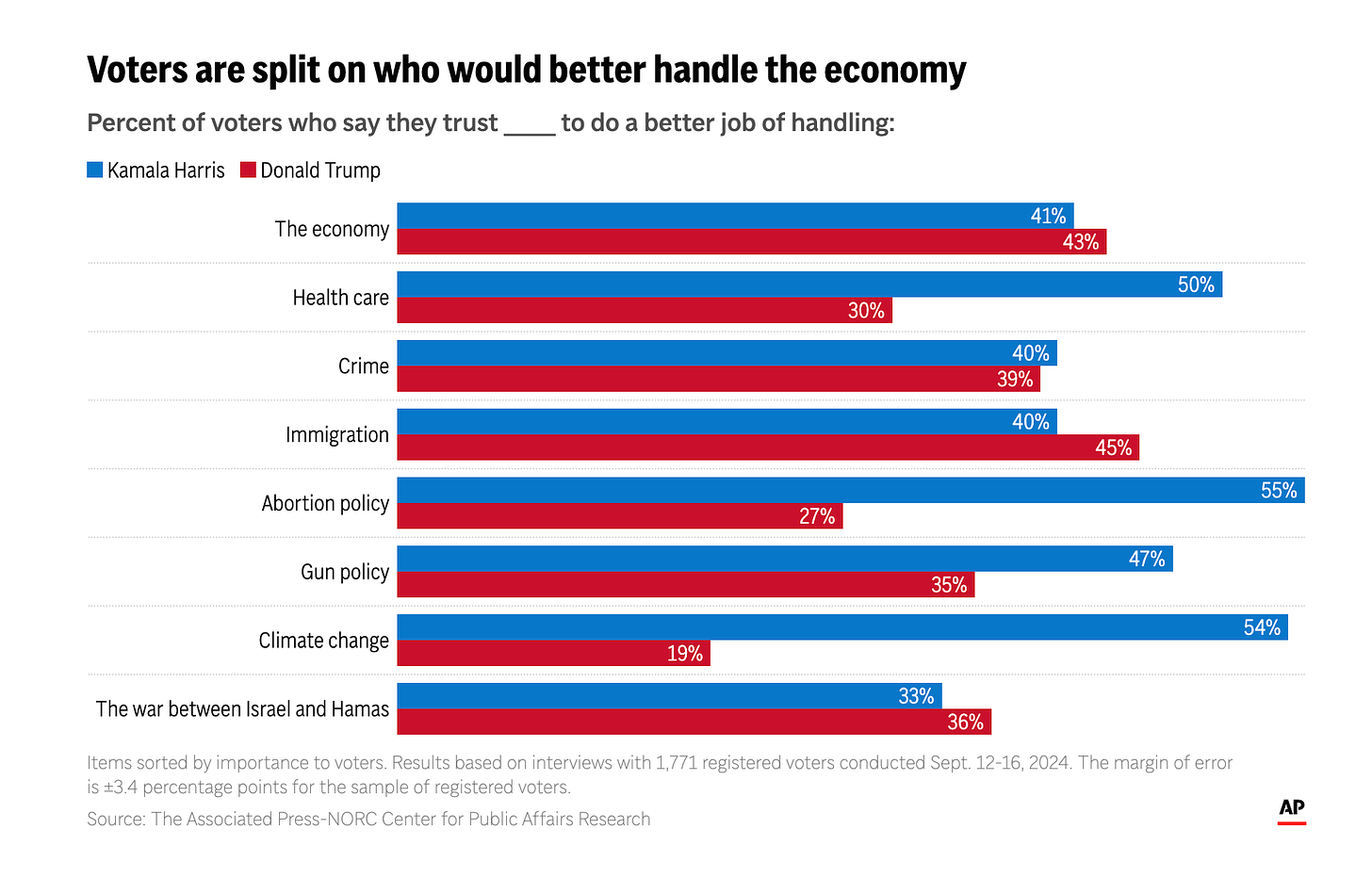The Driving Force
Boeing machinists are making a choice to pay their bills while they strike. They're taking on side hustles as independent contractors.
Some 33,000 members of the International Association of Machinists are on strike at Boeing. They want a 40% raise and the return of traditional pensions the company eliminated about a decade ago, citing “unsustainable growth” in pension costs.
Right now, Boeing’s machinists earn average pay, not counting overtime, of more than $75,000 a year. (The median U.S. annual salary is about $59,000.) According to Boeing, employees also receive a 10% match on 401(k) contributions, paid leave, vacation, tuition assistance and wellbeing programs such as fertility and adoption assistance.
Most people would say Boeing machinists have the kinds of “good union jobs” that the freelance-busting brigade constantly insists are safer and better than being an independent contractor.
All of which is why it’s so notable that the striking Boeing machinists are now turning to independent-contractor roles to put food on their tables.
That’s right: While the Boeing machinists are on strike with their union, they’re simultaneously logging on to make a buck with companies like Uber, whose independent-contractor business model is so loathed by union leaders, they’ve called it an existential threat to society.
Bloomberg reported on Friday:
“[A]s workers stare down the embattled manufacturer for better pay and benefits, the 33,000 members of IAM District 751 have the full benefit of a tight labor market and gig economy that provides a quick transition into jobs that help make ends meet. That gives the union bargaining leverage, potentially frustrating Boeing’s effort to swiftly end a conflict that’s costing it an estimated $100 million each day.”
Oh, the irony of independent-contractor work now being described as a good thing for people seeking an income option that’s ideal for their current needs.
The call is now coming from inside the freelance-busting house. The message is the same one that independent contractors, researchers and voters have been trying to deliver for years.
This message hasn’t changed since the freelance-busting crowd tried to limit the option of self-employment in California back in 2019 with Assembly Bill 5, and independent contractors and voters fought back. It’s been the same message since a bunch of us rose up to stop New Jersey’s copycat bill in 2020, as well as the federal PRO Act the past few years. It was the same message when we went to Congress last year to demand relief from the freelance-busting attacks nationwide.
It’s the same message being sent at this very moment in Seattle, by unionized employees at Boeing.
Americans want choices and control over how we earn a living. Most of us support the existence of unions, but we also want the option of being independent contractors.
Yes, It’s a Side Hustle
If all you know about the current wave of attacks against independent contractors is what you’ve heard the freelance-busting brigade claim again and again, then you probably believe that most independent contractors are rideshare drivers, and that most of them are behind the wheel 40 or even 70 hours a week.
So much evidence tells us this is false—only a small percentage of independent contractors do work for app-based companies at all, let alone full-time—that it’s hard to comprehend how these drivers are ever at the forefront of self-employment policymaking.
Most of the time, people logging on to do tasks for these apps are just like the striking Boeing workers. They’re doing an occasional side hustle to earn some extra cash.
Research on this point goes back years now, even if we leave out all the data from app-based companies themselves. Here are some of the findings from researchers who have no dog in the independent-contractor policy fight:
In 2023, university researchers at the University of Illinois, Michigan State University and the University of Chicago found that the vast majority of app-based workers earn less than $20,000 a year as a side hustle to a traditional job;
Federal Reserve research in 2022-23 found that “gig activities” like driving for a rideshare company are typically not full-time jobs, and are “rarely people’s main source of income.” Only 6% of gig workers (1% of all adults) said they earned at least 90% of their income from gig activities;
Pew Research Center found in 2021 that “a majority of Americans who’ve earned money through a gig platform over the past year say they either spent less than 10 hours in a typical week performing these tasks or don’t do these jobs most weeks”;
IRS research done by academics in 2019 found that only 8.6% of independent contractors did app-based work, and that most of those people were supplementing income from their traditional jobs.
What the Boeing workers are doing right now does not make them an exception. They are the rule when it comes to people who choose to take on app-based tasks.
And based on Bloomberg’s reporting, the Boeing machinists are just like most people who make the same choice. Boeing’s employees see the tasks as a side hustle, not as something they want to turn into their full-time unionizable job:
“I think everybody is ready for the long haul,” said Christopher Dahl, 38, who has worked at Boeing for 10 years, now testing flight-control systems. “I’ve gone through every strike because my parents were Boeing employees, so I know the game. And before, there wasn’t the options like we have to make money on the side.”
Options to make money on the side. That’s the key phrase.
And again, it’s right in line with what researchers from places like Pew have found about the driving force behind most people’s decisions to do app-based tasks in the first place.
Not only do most of the people doing such tasks see themselves as independent contractors, but most Americans agree that they’re right:
“This survey asked Americans for their views on this issue—and a majority (62%) say the most appropriate way to describe ride-hailing drivers is as independent contractors providing a service on behalf of the apps or websites. Smaller shares (35%) say these drivers are best described as employees who work directly for these platforms.”
So why, then, do we continue to see the freelance-busting brigade put these app-based companies at the forefront of media coverage with regard to independent-contractor policymaking?
Why have we seen an expert witness for the Democratic Party testify before Congress that lawmakers should reclassify these independent contractors as employees against their will?
Why is a leading candidate for president of the United States pushing legislation to convert these independent contractors into employees, to give them the “freedom to join a union” that most of them don’t even want from their side hustles?
The answer is tribal politics.
In recent years, the freelance-busting brigade has managed to convince many Americans—and in particular those who lean liberal—that when it comes to independent contractors, what’s happening is the opposite of reality.
Tribalism vs. Truth
Pew’s research offered the clearest look I’ve seen at how people of different political persuasions think about independent-contractor policymaking.
“Democrats and those who lean toward the Democratic Party are more likely than Republicans and GOP leaners to say drivers are most appropriately described as employees—a 19 percentage point difference.”
Think about that 19-point gap compared to how close the upcoming presidential election is predicted to be. Pollster after pollster keeps telling us that the nation is almost evenly divided, and that the vote totals between Vice President Harris and former President Trump could be the tightest count ever.
Only a few issues have a 19-point or better difference on opinion about one candidate being better than the other. According to The Associated Press, those issues are health care (a 20-point difference), abortion (a 28-point split) and climate change (a 35-point spread):
In other words, when Pew’s researchers asked Americans about independent-contractor policymaking, liberal respondents supported the idea of freelance busting by a margin that approaches the most divisive issues in our society.
That’s pretty amazing, considering that almost nobody can even articulate what independent-contractor policymaking is.
With health care, if you ask a liberal-leaning friend why she favors Harris over Trump, she might mention the skyrocketing cost of health insurance. Or the high price of her medications. Or long waits to get an appointment with some of her doctors.
She has actual experiences that underpin her beliefs.
But her expression goes blank if you ask her why independent contractors should be reclassified as employees.
Or if you ask her whether self-employed people even want to be reclassified as employees.
She’s likely never heard of California’s Assembly Bill 5. She doesn’t know what the freelance-busting policy at AB5’s core actually did to independent contractors in that state.
Certainly, she has no idea how the PRO Act that is prioritized in the Democratic Party platform, and that Harris is pledging to make the law of the land, is based on that same kind of California freelance busting—in a way that targets the livelihoods of tens of millions of independent contractors nationwide.
And yet, despite all this policy ignorance, she believes strongly that when Harris says things like this, it means a good kind of change:
This level of support for policymaking that is far from the reality of who most independent contractors are, and that defies what most independent contractors want, sure seems to be rooted in tribal politics. Some researchers go so far as to call it liberal authoritarianism.
It’s not based in actually understanding the policy issue. It’s instead about loyalty to a group, as this research promoted by Harvard University explains:
“Non-tribal politics is characterized by centrist policies. Tribal politics produces extreme policies...”
The freelance-busting brigade’s relentless, remorseless attacks on our freedom to be independent contractors is, in fact, extreme. It’s one thing to say you believe a unionized job is better than freelancing or taking on a side gig. It’s something else entirely to say the government should restrict the choice of self-employment against the wishes and beliefs of most Americans.
As I wrote above, the message that independent contractors, researchers and voters keep sending is clear. It is the opposite of extremist. It’s centrist. It’s reasonable:
Americans want choices and control over how we earn a living. Most of us support the existence of unions, but we also want the option of being independent contractors.
When push comes to shove, as is happening right now at Boeing, most Americans want all possible options to earn a living in whatever way we think is best.
We want the freedom to choose self-employment as we see fit, even if we only exercise our right to make that choice some of the time.
Protecting this freedom, this right to make a choice—that’s what should be at the heart of all independent-contractor policymaking nationwide.
As I continue to watch events unfold in Seattle, I hope this message will finally break through.
And I thank the unionized Boeing employees for helping us all to deliver it.






